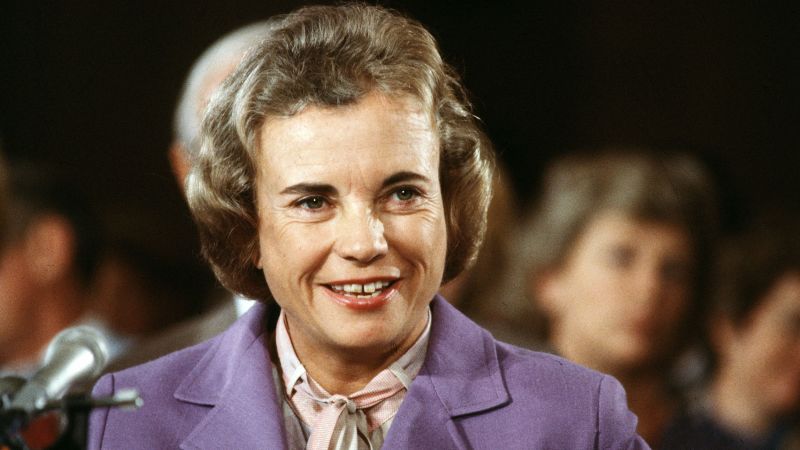
Justice Sandra Day O’Connor, the first woman to serve on the Supreme Court, passed away recently. Her remarkable journey and contributions to the legal system will forever be remembered. Let us take a moment to reflect on her groundbreaking achievements and the impact she had on our society.
Breaking Barriers and Paving the Way
Born in 1930, Sandra Day O’Connor grew up in a time when opportunities for women in law were limited. However, she defied the odds and pursued a career in the legal field. After graduating from Stanford Law School, she faced numerous challenges and rejections. But her determination and perseverance eventually led her to become a trailblazer in the legal profession.
A Historic Appointment
In 1981, Justice O’Connor received a historic appointment from President Ronald Reagan, making her the first female Supreme Court Justice. This landmark moment shattered the glass ceiling and opened doors for countless women in the legal field. Her appointment represented a significant step forward in the fight for gender equality and paved the way for future generations.
A Legacy of Fairness and Moderation
Throughout her tenure on the Supreme Court, Justice O’Connor was known for her commitment to fairness and moderation. She approached each case with an open mind, carefully considering all perspectives before making a decision. Her ability to find common ground and build consensus among her colleagues was truly remarkable.
Broadening the Scope of Civil Rights
Justice O’Connor played a crucial role in shaping the landscape of civil rights in America. Her opinions on cases involving affirmative action, reproductive rights, and gender equality helped to broaden the scope of civil rights protections. Her thoughtful and balanced approach ensured that the rights and liberties of all individuals were safeguarded.
Inspiring Future Generations
Justice Sandra Day O’Connor’s legacy extends far beyond her time on the Supreme Court. Her journey from a small town in Arizona to the highest court in the land serves as an inspiration to all, especially to young women aspiring to make a difference. She showed us that with hard work, determination, and a belief in oneself, anything is possible.
Honoring a Trailblazer
As we bid farewell to Justice Sandra Day O’Connor, let us remember her as a true trailblazer who dedicated her life to the pursuit of justice. Her impact on the legal profession and her tireless efforts to promote equality will continue to resonate for generations to come.

Former Justice Sandra Day O’Connor, the first woman to sit on the Supreme Court, has passed away at the age of 93. Her legacy as a trailblazer and a champion for women’s rights will forever be remembered.
O’Connor inspired generations of female lawyers, breaking barriers in a field that had long been dominated by men. She paved the way for the five women who served on the high court after her nomination. Her success and achievements were a testament to her determination and resilience.
Growing up on the Lazy B Ranch in Arizona, O’Connor learned the values of self-reliance and independence. She was known for branding cattle, driving tractors, and even firing rifles. These experiences shaped her into the strong and fearless woman she became. Late Justice Ruth Bader Ginsburg once described her as a “true cowgirl.”
O’Connor’s impact on the Supreme Court cannot be understated. She was often seen as a moderate conservative and the swing vote on important social issues. Her decisions played a crucial role in shaping the court’s stance on abortion, affirmative action, and other contentious matters.
One of her notable votes was in the landmark case of Planned Parenthood v. Casey in 1992. O’Connor’s support reaffirmed a woman’s right to choose and prevented states from imposing an “undue burden” on those seeking an abortion. However, in 2022, a conservative-leaning court overturned this decision, highlighting the ever-changing landscape of the judicial system.

Affirmative action was another area where O’Connor made an impact. In 2003, she upheld the University of Michigan Law School’s affirmative action program in a 5-4 decision. This ruling aimed to promote diversity and equal opportunities in higher education. Yet, nearly two decades later, the Supreme Court announced a fresh review of affirmative action, indicating the ongoing debates surrounding this issue.
Throughout her career, O’Connor displayed her unwavering commitment to the rule of law and civics education. Chief Justice John Roberts described her as a “patriot” and an “eloquent advocate for civics education.” Even after retiring from the bench, she continued to champion causes such as Alzheimer’s disease and encouraged young people to engage in civic activities.

Justice Sandra Day O’Connor will be remembered as a remarkable figure in American history. Her impact went beyond her role as a Supreme Court justice, as she paved the way for women in the legal profession and fought tirelessly for justice and equality. Her legacy serves as an inspiration for future generations to continue the pursuit of a more just and inclusive society.






















Sandra Day O’Connor was a trailblazer in the legal world. She made history as the first-ever female justice on the Supreme Court. Born on March 26, 1930, in El Paso, Texas, she grew up on the Lazy B Ranch in Arizona, acquiring self-reliance and independence as a young woman.
Her journey to the Supreme Court was paved with determination and hard work. O’Connor attended Stanford Law School, where she met her classmate and future Chief Justice, William Rehnquist. She graduated third in her class and faced numerous challenges as a woman entering the legal profession.
In 1981, O’Connor was nominated by President Ronald Reagan to serve on the Supreme Court. Her confirmation made history, and she was sworn in as the first female justice. O’Connor’s presence on the court marked a significant milestone for women in positions of power and authority.
During her tenure, the court faced many controversial cases, and O’Connor often served as the deciding vote. One of her notable votes was in Planned Parenthood v. Casey, a 1992 opinion that reaffirmed a woman’s right to an abortion. She believed that a state could not impose an “undue burden” on a woman seeking an abortion.
O’Connor’s impact extended beyond her role as a justice. She was known for her friendly and approachable demeanor, which endeared her to the American public. She believed in the importance of civics education and maintaining an independent judiciary.
In 2005, O’Connor announced her retirement from the Supreme Court to care for her husband, who was ailing from Alzheimer’s disease. She left behind a remarkable legacy and continues to inspire generations of women in the legal field.
Sandra Day O’Connor’s contributions to American history were recognized and celebrated. She received numerous awards and honors, including the Presidential Medal of Freedom from President George W. Bush in 2009.
O’Connor’s husband passed away in 2009, and she leaves behind three sons. Her impact on the legal profession and her role as a trailblazer for women will always be remembered.
As Sandra Day O’Connor once said, “In positions of power and authority, women are well-represented.” Her life and career serve as a testament to the importance of diversity and representation in positions of influence.
This story is breaking and will be updated.














